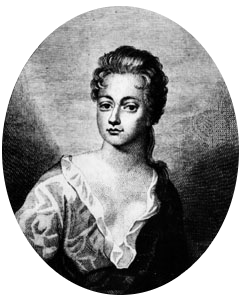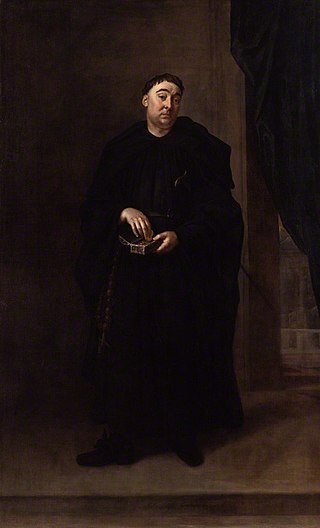Related Research Articles
This article contains information about the literary events and publications of 1696.
Susanna Verbruggen, aka Susanna Mountfort, was an English actress working in London.

Anne Bracegirdle was an English actress and soprano. Most of the plays she performed in involved singing as well as acting. She often performed music written for her by the composer John Eccles, and also sung music written for her by Henry Purcell. She became particularly well known for the song "I burn" which Eccles originally wrote for Bracegirdle to perform in Thomas D'Urfey's play The Comical History of Don Quixote (1694). She also sang music by Eccles in the play The Richmond Heiress (1693) and in William Congreve opera The Judgment of Paris. In 1706 she starred in Giuseppe Fedeli's opera The Temple of Love.

Cave Underhill (1634–1710?) was an English actor in comedy roles.
Samuel Sandford was an English character actor, known for his roles as villains.

Anthony Leigh was a celebrated English comic actor.
Mary, Lady Slingsby, born Aldridge, was an English actress. After a marriage lasting 1670 to 1680 to John Lee, an actor, during which she was on the stage as Mrs. Lee, she was widowed. She then married Sir Charles Slingsby, 2nd Baronet, a nephew of Sir Robert Slingsby, and performed as Lady Slingsby. Theatre historians have pointed out the difficulty in identifying her roles in the period when Elinor Leigh, wife of Anthony Leigh, was performing as Mrs. Leigh, because the homophones "Lee" and "Leigh" were not consistently spelled at the time.
John Bowman (1651–1739) was a British stage actor. He began his career in the Duke's Company at the Dorset Garden Theatre. In 1692, he married Elizabeth Watson, who acted under the name Elizabeth Bowman. He later switched to act at the Drury Lane Theatre. He is also referred to as John Boman.
William Bowen (1666–1718) was a British stage actor. He was part of the United Company from 1689. For a time, he became known for his comic roles. He was fatally wounded in a duel with fellow actor James Quin in 1718.
Elinor Leigh was a British stage actor of the seventeenth century.
Thomas Gillow was an English stage actor of the Restoration era. His name was sometimes written Gilloe or Gillo.
Elizabeth Currer was an Irish stage actress of the Restoration Era. She was a member of the Duke's Company during the 1670s and subsequently part of the merged United Company from 1682. Although she was likely acting in London several years earlier than this, her first known role was in The Conquest of China in 1675. Due to the irregular spelling of the time her surname is sometimes written as Carrier, Corer and Currier amongst other variants.
John Wiltshire was an English stage actor of the Restoration Era. He joined the King's Company in 1675, before transferring to the rival Duke's Company in 1679 possibly as a replacement for Matthew Medbourne who was arrested in the Popish Plot and subsequently died in Newgate. From 1682 until his death he was part of the merged United Company. According to the autobiography of Colley Cibber he subsequently joined the English Army as captain and was killed in action fighting with William III's forces in Flanders during the Nine Years' War. His surname is also sometimes spelled as Wilshire.
George Bright was an English stage actor of the seventeenth and early eighteenth century. He specialised in playing "comic dullards, fops and bouncy servants". After beginning his career in Dublin he joined the Duke's Company at the Dorset Garden Theatre in 1679 and then became part of the merged United Company in 1682.
Thomas Percival or Percivall was an English stage actor of the seventeenth century. He was a member of the Duke's Company from 1671 to 1682 and then the merged United Company until 1686. Throughout his career he was confined to playing supporting roles, never graduating to major parts. He was the father of the actress Susanna Verbruggen. In 1693, following his retirement from the stage, he was arrested for coin clipping, a capital crime, for which he was sentenced to hang at Tyburn. The intercession of his daughter with Mary II saw his sentence commuted to transportation, but before he reached Portsmouth he died of natural causes.
Philip Griffin was an English stage actor of the seventeenth century and early eighteenth century. He joined the King's Company at Drury Lane during the 1670s, and was later a member of the merged United Company from 1685. He was named as a manager at Drury Lane in 1695, but then took military service and was styled as Captain Griffin. In 1699 he went to act in Dublin as part of Joseph Ashbury's company at the Smock Alley Theatre, but was back in London where he acted until retired from the stage in 1707.
John Hodgson was an English stage actor of the late seventeenth century. He joined the United Company in 1688 and his first recorded appearance was in The Treacherous Brothers at Drury Lane in 1690. In 1695 he was one of several actors who broke away to join Thomas Betterton's new company at Lincoln's Inn Fields. His name is sometimes written as Hudson. He was married to the singer Mary Hodgson.
Joseph Harris (c.1650–1715) was an English stage actor and playwright. His earliest known performance was in the United Company's The Bloody Brother in 1685. Earlier mentions an actor named Harris are likely to refer to an earlier lesser-known actor William Harris or even the celebrated Restoration performer Henry Harris. He remained with the United Company until 1695 when he joined Thomas Betterton's breakaway company at the Lincoln's Inn Fields Theatre. He acted there until around 1705, although some reports have him still acting as late as 1715.
John Crosby was an English stage actor of the Restoration Period. He first recorded performance is in 1662 when he appeared in Ignoramus at Whitehall Palace, likely as a child actor. It was further eight years before he was solidly established in the Duke's Company in 1670 beginning with The Forc'd Marriage by Aphra Behn. He became a regular with the company over the following decade, often playing young lover roles. He retired from the stage in 1679 and later became a justice of the peace for Middlesex. He died on 8 April 1724 and was buried in St Sepulchre.
Charlotte Butler was an English stage actress and singer of the seventeenth century. She may have joined the Duke's Company in the 1670s, but her first definite recorded performance was in Aphra Behn's The Revenge (1680) The anonymous A Satyr on The Players describes her,